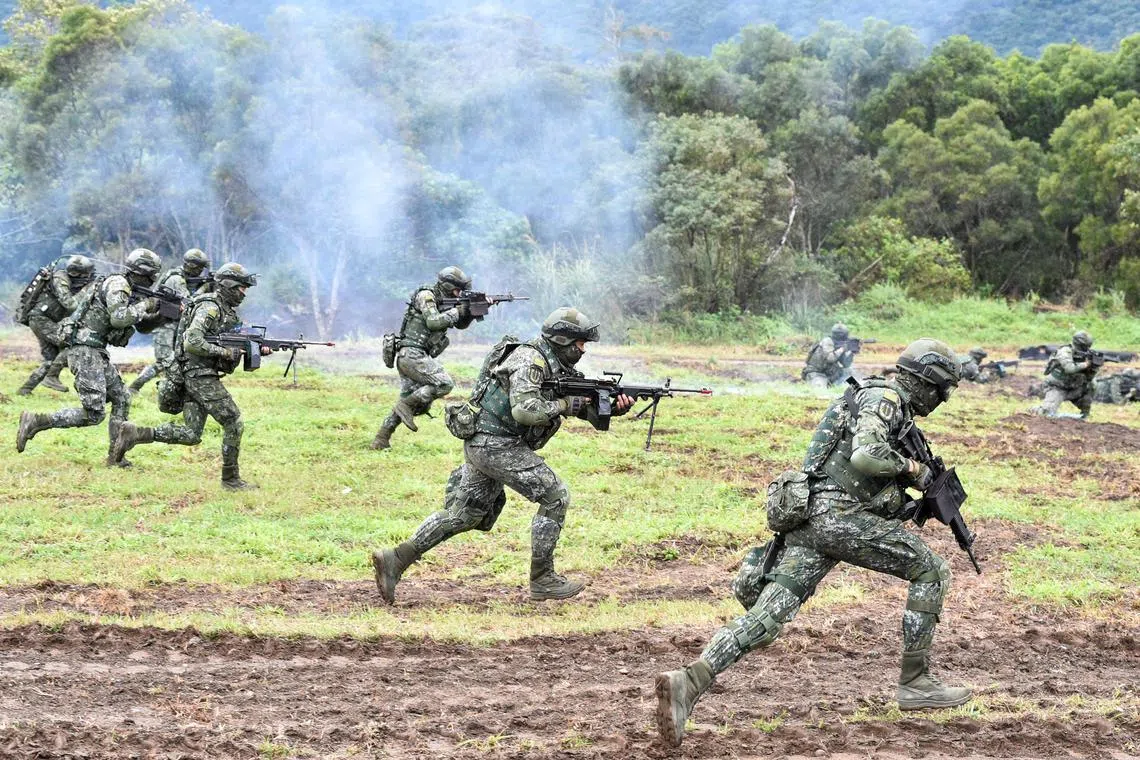Taiwan extends mandatory 4-month military service to 1 year, raises soldiers’ pay
Sign up now: Get insights on Asia's fast-moving developments

The new one-year requirement is set to start in 2024.
PHOTO: AFP
TAIPEI - Taiwan is extending its compulsory military service from the current four months to one year, as part of efforts to bolster the island’s combat readiness amid rising cross-strait tensions.
China’s threat has become even more severe since Beijing’s military drills in August, President Tsai Ing-wen said at a press conference on Tuesday. “Nobody would want a war… but peace will not fall from the sky.”
The new requirement is set to start in 2024 and will affect all Taiwanese males born on and after Jan 1, 2005. From that year, conscripts will also receive a higher pay of NT$26,307 (S$1,152) a month, a big jump from the current NT$6,510.
The changes come as Beijing, which views Taiwan as a breakaway province to be “reunified”, ramps up military pressure on the island.
After US House Speaker Nancy Pelosi’s visit to Taipei in August, which Beijing condemned as an infringement of its territorial integrity, China launched a series of unprecedented military drills, including flying ballistic missiles over the island.
Chinese warships and warplanes have since continued to cross the Taiwan Strait, which separates China and Taiwan, almost daily.
On Sunday, China’s military said it had conducted “strike drills” in the sea
On Monday, the island said that at least 71 Chinese air force aircraft
Beijing’s mounting aggression has led to sustained calls in Taiwan to strengthen its military – including, for a start, having longer training programmes for servicemen.
Critics have long argued that the military service programme, which currently includes bayonet drills, is too old-fashioned.
On Tuesday, Ms Tsai promised improvements to the training programme, and said there will be more shooting exercises and close-combat training, as well as the chance to operate more powerful weapons including anti-tank missiles.
“It was an incredibly difficult decision, but as President and commander-in-chief of Taiwan, it is my unavoidable responsibility... to safeguard national security and ensure future generations can live freely and in a democracy.”
The changes are in the right direction as they show Taiwan’s resolve, defence experts said.
“Washington and the rest of the international community will strongly question Taiwan’s willingness to defend itself if it didn’t extend the military service period. Taipei would have been viewed as irresponsible,” said Dr Chen Liang-chih from the government-funded Institute for National Defence and Security Research in Taipei.
According to a December poll by the Taiwan Public Opinion Foundation, around 73 per cent of respondents aged 20 or older said they supported the idea of extending the military service to at least one year.
But several male teenage students told The Straits Times that they were sceptical about how much a lengthened conscription period would help the island in a war.
“In Taiwan, we always say that military service is a complete waste of time because you do not really learn very much,” said 16-year-old Liao Kuo-sen.
“I’ve heard seniors say that they spent their military service cleaning the floor, so would eight more months of that be useful?”
But the high school student has accepted that he will be among the first batch of recruits to undergo the longer service period. “After what happened in Ukraine, you realise that the threat of war can become real, so it was inevitable that there would be some changes to our military programme,” he said.
The military service extension represents a major about-turn for Taiwan, which had gradually reduced the period from two years until it reached the current four months in 2013, as part of a move to rely more heavily on a volunteer force of professional soldiers instead.
But the island has faced challenges in recruiting enough people to meet its military targets.
According to a Legislative Yuan report in June, Taiwan currently has a professional military force of 162,000, which is 7,000 fewer than the target.
Its military manpower challenges are likely to get worse given the plummeting birth rate.
In 2022, its pool of conscripts is the smallest in a decade
Taiwan’s estimated fertility rate of just over 1.08 in 2022 is the lowest in the world, based on the Central Intelligence Agency World Factbook.



